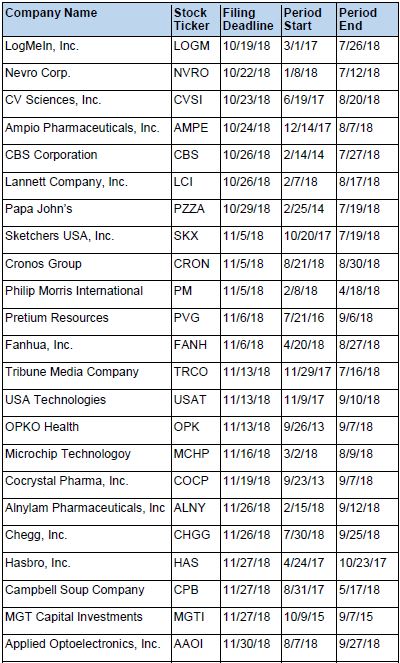CPB Lawsuit; Levi & Korsinsky Announces Campbell Soup Class Action
Levi & Korsinsky, LLP
October 10, 2018
Marder v. Campbell Soup Company et al 1:18-cv-14385-NLH-JS — On September 28, 2018, investors sued Campbell Soup Company (“Campbell” or the “Company”) in United States District Court, District of New Jersey. The Campbell Soup class action alleges that plaintiffs acquired Campbell stock at artificially inflated prices between August 31, 2017 and May 17, 2018 (the “Class Period”). They are now seeking compensation for financial losses incurred upon public revelation of the Company’s alleged misconduct during that time. For more information on the CPB Lawsuit, please feel free to contact us today!
Summary of the Allegations
Company Background
The Company (NYSE:CPB) is a self-described “global food company” that generates roughly $8 billion in annual sales. As such, it sells “a range of high-quality soups and simple meals, beverages, snacks and packaged fresh foods.”
The Company’s history dates to 1869, when fruit merchant Joseph Campbell and icebox maker Abraham Anderson teamed up to create the business now known as Campbell Soup Company. They opened their first plant in Camden, N.J., where the Company is still based today.
In 1894, Joseph Campbell was replaced as president and retired, severing the family’s ties with the business. It nevertheless retained his surname as part of its moniker and introduced the first can of Campbell’s ready-to-eat tomato soup the next year. In 1911, the business reached another significant milestone with the national distribution of Campbell’s soups. Spurred by continued domestic growth and success in the ensuing decades, Campbell created its international division in 1957.
Over the next 60 years, the Company continued its expansion and introduction of new products. In all, Campbell now has three divisions or segments. These are: “America’s Simple Meals and Beverages,” which features its flagship brand, Campbell’s soup; “Global Biscuits and Snacks”; and “Campbell Fresh.”
Summary of Facts
Campbell and two of its current and former officers (the “Individual Defendants”) are now accused of deceiving investors by lying and withholding critical information about the Company’s business practices and prospects during the Class Period.
Specifically, they are accused of omitting truthful information about the performance of the Campbell Fresh division from SEC filings and related material. By knowingly or recklessly doing so they allegedly caused Campbell stock to trade at artificially inflated prices during the time in question.
The truth emerged in a series of events that transpired between November 21, 2017 and May 18, 2018. In each case, the Company announced less than stellar financial performances linked to its Campbell Fresh Division.
Everything came to a head on May 18, when the Company, “reported disappointing financial results for the third straight quarter and admitted that the Campbell Fresh division was not profitable for the first nine months of fiscal 2018.” As a result, the Company also said it had to make its third consecutive quarterly reduction to is fiscal year 2018 guidance.
A closer look…
As alleged in the September 28 complaint, the Company and/or Individual Defendants repeatedly made false and misleading public statements during the Class Period.
For instance, during a quarterly conference call held on August 31, 2017, one of the Individual Defendants said that the Company anticipated that the Campbell Fresh Division would “return to profitable growth in fiscal 2018.”
During the same conference call, the other Individual Defendant said the Company “expect[ed] [Campbell Fresh] to have sufficient capacity to support [the Company’s] growth plans in fiscal 2018.”
Then, on a November 21, 2017 conference call following the announcement of the Company’s disappointing quarterly results, one of the Individual Defendants tried to reassure investors by saying that the Company, “expect[ed] to see profitability pretty quick in Campbell Fresh.”
Impact of the Alleged Fraud on Campbell’s Stock Price and Market Capitalization
| Closing stock price prior to disclosures:
|
$39.22 |
| Closing stock price the trading day after disclosures:
|
$34.37 |
| One day stock price decrease (percentage) as a result of disclosures:
|
12.37% |
The following chart illustrates the stock price during the class period:
Actions You May Take
If you have purchased shares during the Class Period, you may join the class action as a lead plaintiff, remain a passive class member, or opt out of this litigation and pursue individual claims that may not be available to the class as a whole.
NOTE: The deadline to file for lead plaintiff in this class action is November 27, 2018. You must file an application to be appointed lead plaintiff prior to this deadline in order to be considered by the Court. Typically, the plaintiff or plaintiffs with the largest losses are appointed lead plaintiff.
In order to identify your potential exposure to the alleged fraud during the time in question, you may wish to perform an analysis of your transactions in Campbell common stock using court approved loss calculation methods.
Recently Filed Cases
Listed below are recently filed securities class action cases being monitored by us, along with the class period and the deadline to file a motion to be appointed as the Lead Plaintiff in the action. Please contact us if you would like an LK report for any of these cases:
About Us
Levi & Korsinsky is a leading securities litigation firm with a hard-earned reputation for protecting investors’ rights and recovering losses arising from fraud, mismanagement and corporate abuse. With thirty attorneys and offices in New York, Connecticut, California and Washington D.C., the firm is able to litigate cases in various jurisdictions in the U.S., England, and in other international jurisdictions.
Levi & Korsinsky provides portfolio monitoring services for high-net worth investors and institutional clients. Our firm also assists investors in evaluating whether to opt-out of large securities class actions to pursue individual claims.
For additional information about this case or our institutional services, please contact us.
